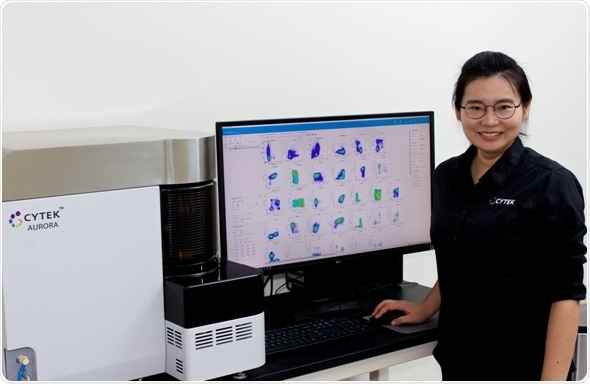Flow cytometry’s next chapter is here. Opening the door to deeper immunological insights, Cytek Biosciences Inc., a leading provider of flow cytometry instrumentation, today announced that it has successfully developed and demonstrated a high-quality 40-color panel from a single sample using the Cytek® Aurora advanced flow cytometry system. The innovative technology onboard, inspired by the telecom industry, differentiates Cytek's systems and enables ease of use, unprecedented high performance-to-price ratio, expanded experimental design flexibility, superb data quality, simplified workflows, and a greater choice of dyes and specificities that can be run in one panel.

A Cytek Biosciences systems engineer and application specialist proudly shares the record breaking 40-color fluorescence flow cytometry panel achieved on a 5-laser Cytek Aurora. Credit: Cytek Biosciences
As the flow cytometry market continues to expand rapidly and reach an estimated $8.92B globally by 2026, we fully expect that the Aurora will become a large, powerful and capable presence in the market. We are committed to addressing the lack of access to advanced scientific instrumentation and giving scientists the tools they need to take their fields to the next level. High-quality 40-color data makes in-depth insights and statistically powerful numbers from rare sample populations possible – and accelerates the pace of scientific discovery.”
Dr. Wenbin Jiang, CEO of Cytek Biosciences
Flow cytometry hits the mark
The fields of immunology and immuno-oncology are focused on studying billions of cells in the human body – some of which can identify and destroy invading organisms and tumors – and striving to understand them and their functions is critical to developing successful disease treatments. Enabling scientists in these fields with tools that can extract as much information as possible from a single sample is extremely important. This is where flow cytometry comes in.
With its ability to profile a large panel of heterogenous cells on a cell-by-cell basis from a single sample, flow cytometry is widely used by scientists to glean in-depth information in cell biology; for example, in infectious disease, cancer, immunology, immunotherapy, and stem cell research. Additional areas where flow cytometry is used include DNA and extra-cellular vesicle research. This list of applications will increase as a growing number of scientists gain access to flow cytometers with higher throughput and increased multiplexing capabilities – a number that Cytek is committed to growing.
With flow cytometry, scientists may also glean in-depth, patient-specific immune function information the same day the sample is obtained. There are many applications of flow cytometry in the immuno-oncology field. For example, in patients battling acute lymphoblastic leukemia, lymphomas or blood cancers that have been unresponsive to commonly used cancer treatments, T cells can be identified, removed and engineered to specifically target and destroy cancer cells when injected back inside them (commonly referred to as CAR-T therapy).
The challenge, until recently, has been that conventional flow cytometers only had the capability to analyze a maximum of 20 colors. The Cytek Aurora has shifted the paradigm of what scientists thought was possible from a fluorescence-based flow cytometer.
Expanding the horizons of science
The Cytek Aurora advanced flow cytometry system features a unique combination of patent-pending innovative technologies and is available with up to five lasers to enable analyzing up to 40 markers simultaneously in one sample. With the Aurora, users can combine all of their markers in one sample and achieve high resolution for each individual marker. The Aurora provides scientists flexibility in dye choices, the power to extract sample autofluorescence, the ability to get up and running quickly with its intuitive workflows, and the means to extract highly multiplexed high-quality data – from a single test – all at a fraction of the price of other technologies and flow cytometry systems.